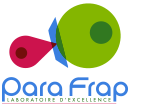-
PARAFRAP
- Qui sommes-nous
- Objectifs du Labex
- Laboratoires de recherches
- Coordinateurs
- Collaborateurs industriels
- Tutelles et soutiens
- GOUVERNANCE
- Organisation
- Comité de pilotage
- Comité exécutif
- Conseil scientifique international
- Comité Institutionnel
- FORMATION
- CONFERENCES
- THÉMATIQUES
- Exploitation des données post génomiques
- Mécanisme de la pathogénie
- Biologie Cellulaire et Moléculaire
- Nouvelles stratégies d'interventions thérapeutiques
- Plateformes
- VALORISATION
-
PARAFRAP
- Qui sommes-nous
- Objectifs du Labex
- Laboratoires de recherches
- Coordinateurs
- Collaborateurs industriels
- Tutelles et soutiens
- GOUVERNANCE
- Organisation
- Comité de pilotage
- Comité exécutif
- Conseil scientifique international
- Comité Institutionnel
- FORMATION
PostDoc l Trypanosoma l Bordeaux, FR

Postdoc (M/F) Molecular and cell biology in Trypanosoma brucei
A 24-month post-doctoral position starting on November 1st 2025 (or before) and funded by the French National Research Agency (ANR) is available in the Microbiologie Fondamentale et Pathogénicité (MFP) laboratory in Bordeaux under the supervision of Dr Frédéric Bringaud (iMET team: https://www.mfp.cnrs.fr/wp/la-recherche/intermediate-and-energy-metabolism-of- trypanosomes-imet/).
Project: TrypaDiff - Glycerol, a new key player in the trypanosome parasite
Trypanosoma brucei is an extracellular parasite responsible for sleeping sickness in Africa and transmitted by a blood-feeding insect vector, the tsetse fly. In its mammalian host, the rapidly dividing slender forms predominate in the blood and tissues. At the peak of parasitaemia, slender forms differentiate into growth-arrested stumpy forms (ST) to protect the host by preventing high parasitaemia. Slender to stumpy differentiation relies on a quorum sensing mechanism triggered by the accumulation of di- and tripeptides produced by oligopeptidases excreted by the parasites. The current model of T. brucei transmission from mammals to the insect vector emphasises the key role of the quorum sensing-derived stumpy forms (ST-QS) produced in the blood. However, this may not be the only differentiation pathway.
Our recent unpublished data showed that glycerol, which is abundant in the skin and adipose tissues where the parasites also reside, induces differentiation of slender to stumpy-like forms (ST-Glyc), which are competent for differentiation into parasitic forms present in the insect. We thus propose a rational working hypothesis, in which the glycerol present in the skin would induce the production of ST-Glyc mostly responsible for the parasite transmission to the fly.
To study this new paradigm, our ANR-funded consortium composed of Dr Frédéric Bringaud (Bordeaux, coordinator of the TrypaDiff project), Dr Brice Rotureau (Institut Pasteur Paris - IPP) and Dr Lucy Glover (IPP) will (i) characterize glycerol-induced ST-Glyc forms, (ii) determine the biological relevance of these parasites, and (iii) characterize the signaling pathway(s) involved in their glycerol-induced differentiation. This program will contribute to a better understanding of the developmental biology of trypanosomes responsible for human and domestic animal diseases and will highlight possible new ways to control parasite transmission.
Experimental approaches
In vitro culture and differentiation of trypanosomes, preparation of cell samples for multiomics analyses (proteomics, metabolomics, genomics, single cell transcriptomics) performed in collaboration with specialised platforms, analysis of candidate genes involved in the glycerol-induced differentiation process by reverse genetic (KO and epitope-tagging using CRISPR-cas9, conditional RNAi knockdown and overexpression).
Requirements
Candidates with at least a PhD in Biological Science, especially in Parasitology or Cell Biology are encouraged to postulate. Highly motivated and autonomous candidates are wanted. Skills in cell culture and molecular biology would be appreciated.
Application
Applicants should send a CV, a bibliography, a motivation letter and the names of three references in a single pdf file to Dr Frédéric Bringaud before September 15th 2025 (see details in the PDF file).
lundi 9 février 2026INSERM Workshop: Modern Methods in Molecular Parasitology (Montpellier, 4–6 November 2026)
The INSERM workshop “Modern methods in molecular parasitology” will take place in Montpellier, France, from 4–6 November 2026. This event will bring together leading experts in...
lundi 9 février 202615th CAPF (the French Anti-Parasitic and Anti-Fungal Consortium) workshop , March 16-17, 2026
The 15th CAPF (French Anti-Parasitic and Anti-Fungal Consortium) workshop will take place on 16–17 March 2026 in Strasbourg (France). This event is an excellent opportunity for students and postdoctoral researchers to participate and contribute...
mardi 20 janvier 2026Call for Applications: New Junior Research Groups at Institut Pasteur
Call for Applications: New Junior Research Groups at Institut Pasteur The Institut Pasteur has launched an international call to recruit new junior group leaders.This is a unique opportunity for high-potential scientists to...
lundi 12 janvier 2026Ingénieur·e d’étude / Research Engineer – Mosquito Immunity (IBMC, Strasbourg)
JOB : Ingénieur·e d’étude / Research Engineer – Mosquito Immunity (IBMC, Strasbourg) 🇫🇷 Le laboratoire Mosquito Immune Responses recrute un·e ingénieur·e d’étude à l’IBMC (Strasbourg). La personne recrutée sera en...
mardi 6 janvier 2026Applications Open for the Biology of Parasitism Course 2026
Applications are now open for the 2026 Biology of Parasitism (BoP) course, taking place June 12–July 23, 2026 at the Marine Biological Laboratory in Woods Hole, MA.This intensive 6-week program offers PhD students and postdocs advanced training in...
jeudi 27 novembre 2025Research Assistant/Associate Position | Molecular Parasitology | Newcastle University
Newcastle University offers a full-time, fixed-term position (3 years) for a Research Assistant or Research Associate in Molecular Parasitology — funded by the Medical Research Council (MRC). About the Opportunity Location:...
jeudi 13 novembre 2025PhD Opportunity | African Trypanosomes | University of York
Multidisciplinary PhD opportunity in the fields of infectious diseases, gene regulations and molecular signalisation. Fully Funded 4-Year PhD at the University of York A fully funded PhD opportunity is available at the...
mardi 14 octobre 2025Recap of the EMBO Workshop 2025
The EMBO Workshop 2025 “Host–Parasite Relationship: From Mechanisms to Control Strategies”, took place from October 5–8, 2025, on the beautiful Île des Embiez (France). Organized within the framework of the LabEx ParaFrap and...
jeudi 31 juillet 2025PostDoc l Toxoplasma l Montpellier, FR
Postdoc (M/F) in molecular and biochemical parasitology (Toxoplasma gondii) A 24-month post-doctoral position starting on January 2026 and funded by the French National Research Agency (ANR) is available in the in the...
lundi 9 juin 2025PostDoc l Trypanosoma l Bordeaux, FR
Postdoc (M/F) Molecular and cell biology in Trypanosoma brucei A 24-month post-doctoral position starting on November 1st 2025 (or before) and funded by the French National Research Agency (ANR) is available in the...
Bluesky feed
PROGRAMME DE FORMATION FR
Programme Doctoral InternationalProgramme Post-doctoralACTUALITÉS
© 2023. Tous droits réservés by MLCOM
Notre site LabEx ParaFrap utilise des cookies pour réaliser des statistiques de visites, partager des contenus sur les réseaux sociaux et améliorer votre expérience. En refusant les cookies, certains services seront amenés à ne pas fonctionner correctement. Nous conservons votre choix pendant 30 jours. Vous pouvez changer d'avis en cliquant sur le bouton 'Cookies' en bas à gauche de chaque page de notre site. En savoir plus
Paramétrages de cookies
×Cookies fonctionnels
Ce site utilise des cookies pour assurer son bon fonctionnement et ne peuvent pas être désactivés de nos systèmes. Nous ne les utilisons pas à des fins publicitaires. Si ces cookies sont bloqués, certaines parties du site ne pourront pas fonctionner.
Mesure d'audience
Ce site utilise des cookies de mesure et d’analyse d’audience, tels que Google Analytics et Google Ads, afin d’évaluer et d’améliorer notre site internet.
- Google Analytics
- Google Ads
Contenus interactifs
Ce site utilise des composants tiers, tels que NotAllowedScript699bdba2d3534ReCAPTCHA, Google NotAllowedScript699bdba2d3209Maps, MailChimp ou Calameo, qui peuvent déposer des cookies sur votre machine. Si vous décider de bloquer un composant, le contenu ne s’affichera pas
- Google Maps
Pour en savoir plus, cliquez sur le lien.
Voir le site officiel - Calameo
Pour en savoir plus, cliquez sur le lien.
Voir le site officiel - reCaptcha V2
Pour en savoir plus, cliquez sur le lien.
Voir le site officiel - reCaptcha V3
Pour en savoir plus, cliquez sur le lien.
Voir le site officiel
Réseaux sociaux/Vidéos
Des plug-ins de réseaux sociaux et de vidéos, qui exploitent des cookies, sont présents sur ce site web. Ils permettent d’améliorer la convivialité et la promotion du site grâce à différentes interactions sociales.
- Twitter
Pour en savoir plus, cliquez sur le lien.
Voir le site officiel
Session
Veuillez vous connecter pour voir vos activités!Autres cookies
Ce site web utilise un certain nombre de cookies pour gérer, par exemple, les sessions utilisateurs.




